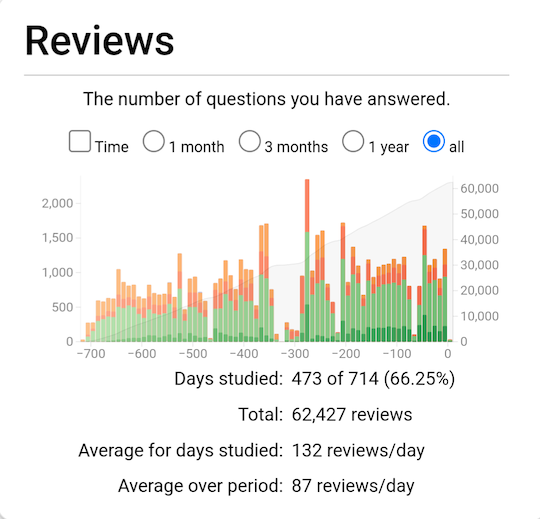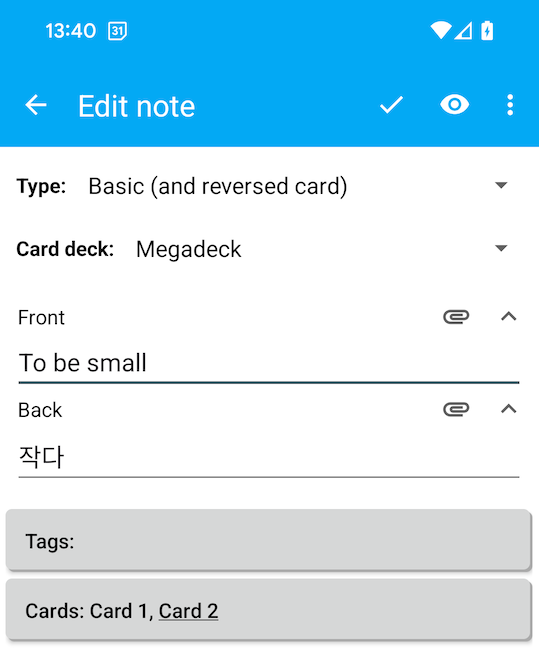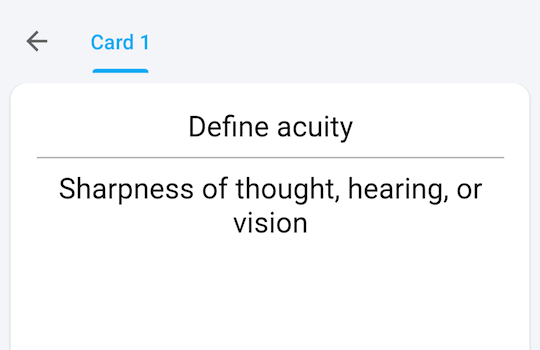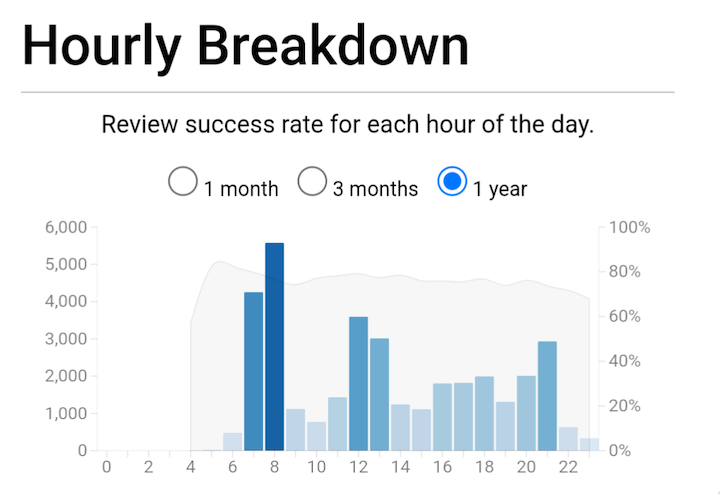I’ve been using Anki to memorise Korean vocabulary, programming language syntax, word definitions, Polish vocabulary, and poetry for over two years.

I love Anki. I feel like I have a superpower where I can memorise anything I want. It’s made learning Korean vastly easier; made me enjoy my work more; made me more confident in speaking Polish; eclipsed hundreds of those frustrating moments where something is on the tip of my tongue but just out of reach. I have over 2,700 cards and I don’t see myself stopping any time soon.
First encounters, unsuccessful
I think I first came across spaced repetition through Michael Nielsen’s article, or perhaps it was Andy Matuschak’s or Gwern’s. It was something I felt like I should do, everyone says it’s so great!
First, I used it to learn Spanish vocabulary. I felt I was almost conversational in Spanish and a wider vocabulary would help push me over the threshold. I downloaded existing decks of thousands of cards from online and quickly became overwhelmed. When I started I was so eager to get going. I studied 30 new cards a day, overriding the default of 5. After a week of 30 new cards a day I had to review more than 150 cards a day, most of which I’d get wrong, and my review would easily take half an hour. What a bore, half an hour on Anki? I had better things to do even in COVID.
I didn’t see Anki having any effect on my life either. I wasn’t using Spanish outside of lessons, other than a trip to Barcelona I never reaped the fruits of my labours and had any ‘aha!’ moments where it clicked that I could remember words I would have otherwise struggled to recall.
I downloaded other decks of things I thought were worth knowing. Rulers of Britain, states of India, and the like. These decks were really well made, clear images showing India with a state missing, help with pronounciation, but I never learned these either. Worse yet, now I had several decks. One for Spanish, one for rulers of Britain, one for the states of India, etc. Each deck had its own at-least-15-minute-review-time. Excruciating.
Attempt two, Korean
I came back to Anki when I started learning Korean, just over two years ago. This time, I was much more motivated. My now wife’s family is Korean so I’d be in it for the long term, and I don’t consider myself gifted with languages so I’d need all the help I could get.
For every Korean word I want to learn I make an Anki note with English on the first side, and Korean on the second. This generates two cards: one mapping from English to Korean, and one from Korean to English.

The benefits of using Anki are enormous. At first I was dismayed, five new cards a day with a bi-directional mapping works out to only 900 new words a year, it would take me more than two years to achieve what’s considered a starter-level vocabulary of 2000 words. But I persisted, and I’ve slowly seen my Korean vocabulary grow and grow.
I do Korean lessons most weeks, with long breaks interspersed for when life gets busy, and my teacher is continuously surprised when we restart lessons that my memory hasn’t worsened over the interludes. I still struggle immensely with grammar, fluency, accent, and so on, but having most vocabulary at my finger tips, and that vocabulary remaining constant, has made learning super infinitely easier.
Better yet, I can now feel the effects of using Anki. I don’t forget words! I can pick out parts of what my wife’s parents say, even if I don’t understand the complete gist. I can add any words they text me as Anki notes and never forget them again. I care about every card I review because it’s a piece of information that has left me clueless and frustrated in the past.
This feedback loop is incredibly satisfying but I only saw after using Anki for six months. Anki is really hard to get into. Both the initial enthusiasm for a new powerful learning technique is damning (you have an urge to download existing decks of 10,000 Spanish words and learn 30 new words a day), and then maintaining the faith that it will work until it eventually does.
What works for me
I would love for others to go from a state of thinking they have bad memory, to being able to recall anything that’s important to them. Over the last two years I’ve adapted my practice and enjoyed Anki much more, I think the following are important and I haven’t seen them mentioned anywhere:
- Using a single Megadeck
- Only five new cards a day
- I care about all my cards
- Two way mappings are important
I’ll go through them in turn.
Using a single Megadeck
I put all my cards in one deck. In the space of a 15-minute review it’s usual for me to recall Korean and Polish vocabulary, how to identify edible fungi, the years that Queen Victoria reigned, Rust programming language syntax, and a snippet from Paradise Lost.
Surprisingly and contrary to my expectations, this doesn’t fuck me up. My brain is completely capable of handling jumping across different topics, as well as the dramatic difference in recollection time (<1s for vocab, ~10s for poetry). If anything, this keeps me on my toes and prevents me from going on auto-pilot.
Having a single deck means I know I have a single 10 to 15 minute review to do each day. This is completely manageable amidst time on public transport, waiting for lifts, etc. Once I’m done with my Megadeck, there’s no more Anki for me to do and I can feel a sense of accomplishment. It’s simple.
Only five new cards a day
Five new cards a day results in 70 - 85 reviews per day for me. That’s about 10 to 15 minutes of review time. More new cards have felt like I’m learning more, but soon I have 100 - 130 reviews per day, and I don’t want to spend 20 - 30 minutes a day on Anki. I get demotivated and stop. I care about learning things over the period of years, sustained motivation is key.
I care about all my cards
Motivation is always the hardest. To ensure I only have cards of things I really care about, I only use cards I’ve made myself. I create notes for Korean vocabulary I’ve seen or had said to me but I didn’t know at the time and I delete cards without much thought if during review they just don’t jive. It could be as simple as a note is too complex so I keep failing to recall it. If the information is important enough, it’ll come up again, and I’ll write a better note next time.
Two way mappings are important
The memory I’ve got from Anki is surprisingly one-directional, following the card. I’ve noticed this most for definitions I’ve added of English words for example see the following card

If you described acuity to me, I would probably struggle to name it as acuity, but if you asked me what acuity was, I could tell you instantly.
That suits me, because I see ‘acuity’ three or four times a year in articles and it always frustrates me that I have to look it up. I don’t really care about using the word myself, I don’t have that kind of acuity.
This one-directional memory is why I always have both mappings of English to Korean vocabulary, While I’m still early in my learning journey for Korean, I need to be able to bidirectionally translate for myself. Contrast this with Polish, in which I’m fluent but I’m using Anki to learn more complex, archaic or formal words, I have one directional Polish mappings of words to definitions.
This has made me realise it’s critical that the mapping in your question is the one you care about. Are you sure you want to learn that piece of knowledge that way round? Is that how you’ll actually use it in the real world? This may only become apparent to you when you realise you need to recall something you know you’ve got as an Anki note, but you still can’t recall it, because it’s mapped the wrong way.
More widely on the topic of writing notes well, Andy Matuschak has written an excellent page.
How I want to use Anki
Language learning via Anki is obvious. Besides Korean, over the next 10 years I want to use Anki to enable my creative pursuits. This isn’t easy, in some cases it can be a matter of making Anki notes while studying a topic to force yourself to pay more attention, in the same way that writing in the margins of a book helps. The most difficult way I’m trying to use Anki is to have a level of meta-awareness for things I do routinely. I’m trying to notice where I stumble and where having a small piece of information at hand would unblock me from having to pause on something I’m enjoying and enable flow state instead. Cooking is an easy case I’d like to start with, what if I never had to look up the amount of water and stock I need to use for a risotto? Or what flavours or vegetables paired well with red onion for a summery French dish? I could focus on the fun things.
Happily, I’m over the initial barrier, and I’ve seen the benefits of remembering anything I so choose. I’m looking forward to all the delights over the next few years, noticing situations in which I just know the thing and can move onto more exciting aspects of whatever I’m doing, rather than having to look something up.
Appendix
What is Anki
Anki is a way to use technology to practice spaced repetition. Spaced repetition is the best known way to memorise facts for the long term by changing the rate at which you review cards according to your ease of recalling that piece of information
Anki takes care of the humdrum task of determining when you should review that card. Rather than spending time deciding when to review my cards again, Anki will show me the card at the appropriate time, whether that’s in one day, or nine months, according to an evidence-based algorithm.
What’s up with my review accuracy

Only a ~30% difference in the accuracy of my reviews if I’m reviewing at 4am (it’s a separate question as to why I’d be on the night bus home, probably plastered, doing my Anki), versus peak review accuracy at 6am?
I need to get the uncertainty intervals on this.